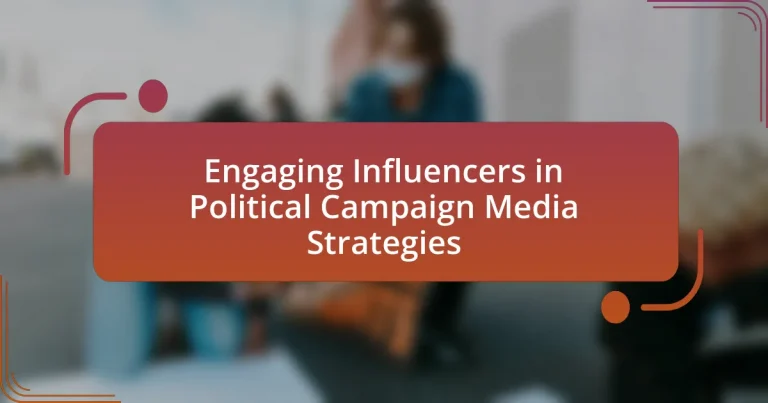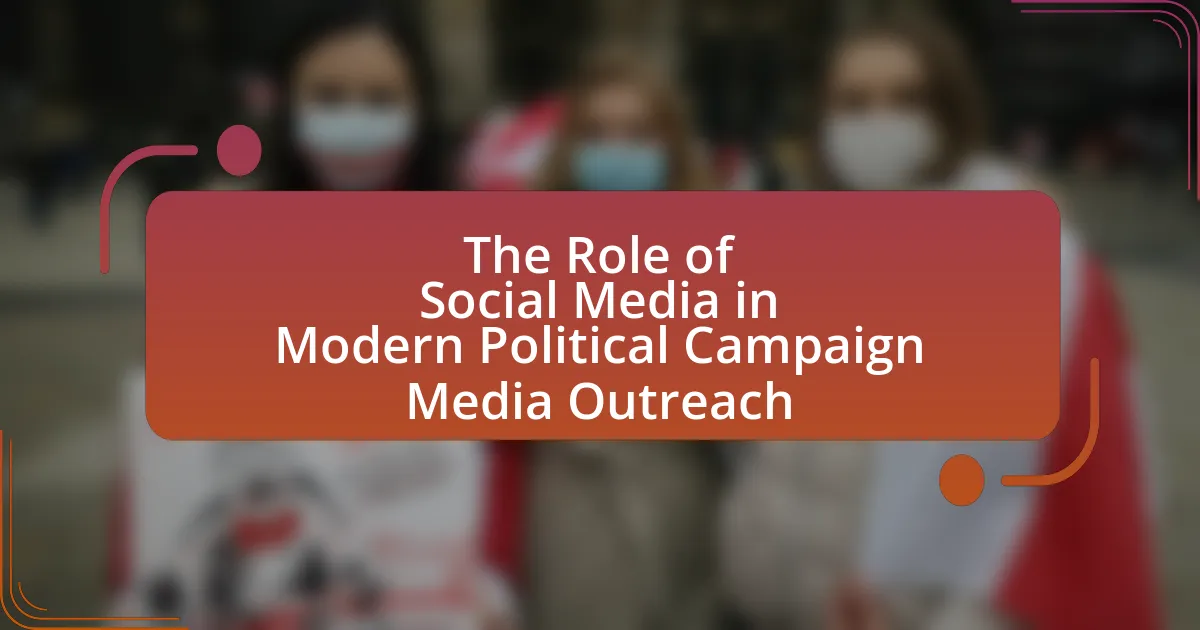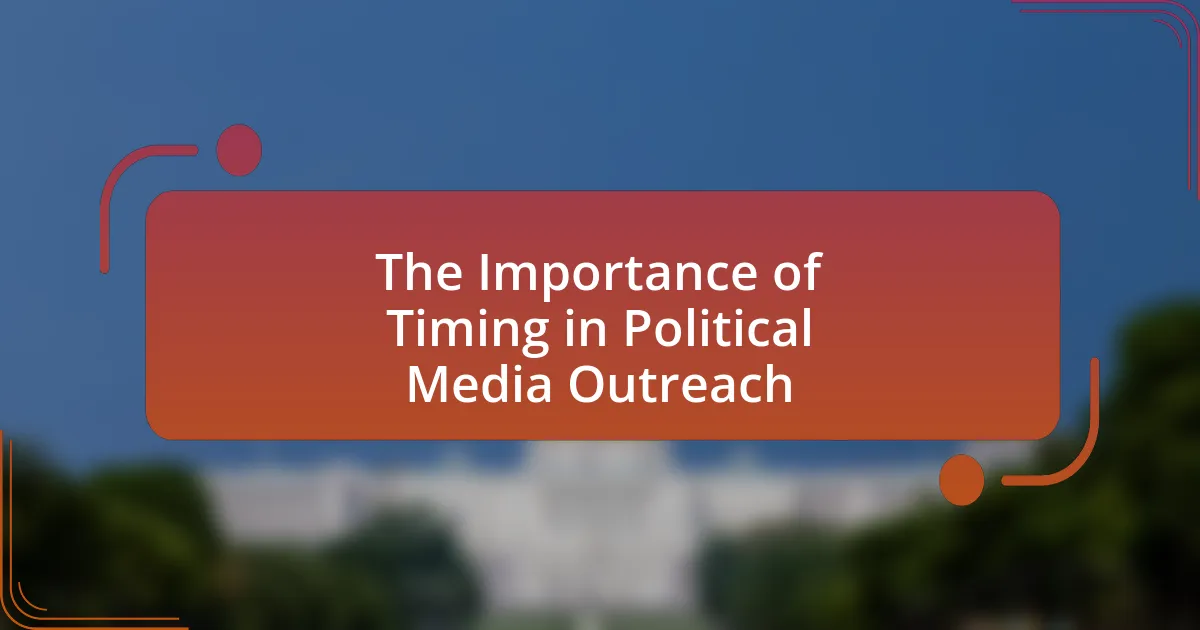The article focuses on the role of influencers in political campaign media strategies, highlighting their significant impact on voter engagement and public opinion. It discusses how influencers, particularly micro-influencers and political activists, can effectively mobilize support and shape perceptions among specific demographics, especially younger voters. Key strategies for engaging influencers include personalized outreach, establishing mutual value, and utilizing data-driven insights to select the right influencers. The article also addresses best practices for measuring the effectiveness of influencer partnerships and overcoming common challenges faced in these collaborations, emphasizing the importance of authenticity and alignment with campaign values.
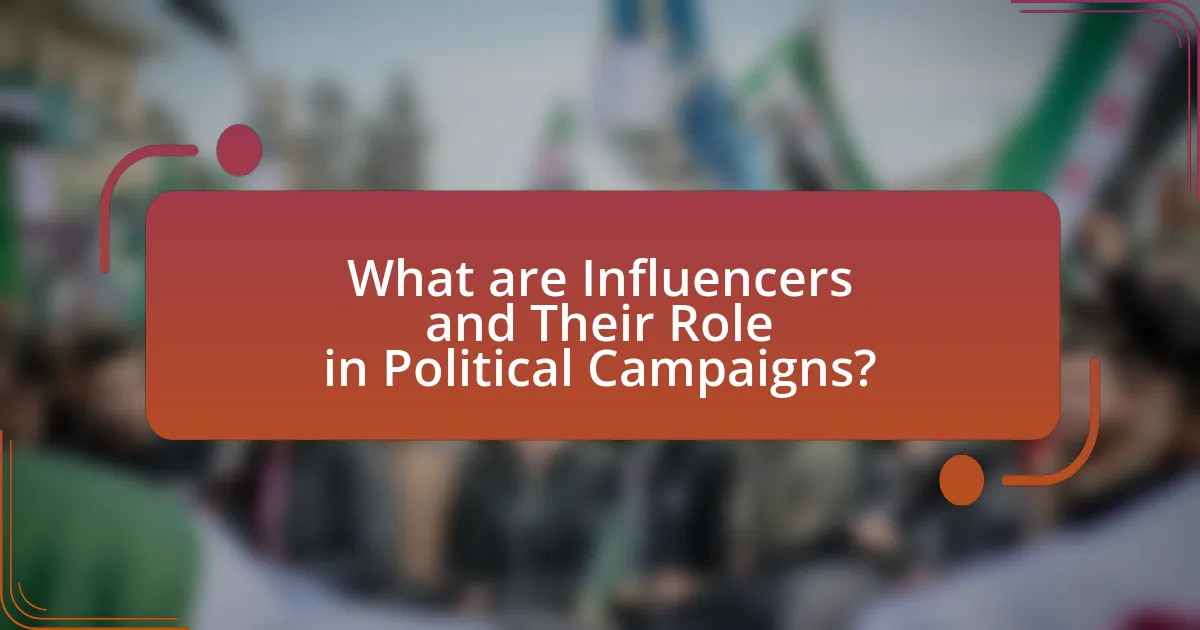
What are Influencers and Their Role in Political Campaigns?
Influencers are individuals who have the power to affect the purchasing decisions and opinions of others due to their authority, knowledge, position, or relationship with their audience. In political campaigns, influencers play a crucial role by leveraging their platforms to reach and engage voters, often shaping public perception and mobilizing support for candidates or issues. For instance, a study by the Pew Research Center found that 70% of young voters are influenced by social media personalities when making political decisions, highlighting the significant impact influencers have in modern political discourse.
How do influencers impact voter engagement in political campaigns?
Influencers significantly enhance voter engagement in political campaigns by leveraging their established trust and reach within specific demographics. Their ability to create relatable content and foster community discussions encourages followers to participate in the electoral process. For instance, a study by the Pew Research Center found that 55% of social media users aged 18-29 reported being influenced by online personalities when considering political issues. This demonstrates that influencers can effectively mobilize younger voters, increasing turnout and participation rates.
What types of influencers are most effective in political contexts?
Micro-influencers and political activists are the most effective types of influencers in political contexts. Micro-influencers, who typically have a smaller but highly engaged following, can foster trust and authenticity, making their endorsements more impactful. Research indicates that micro-influencers achieve higher engagement rates, with studies showing that they can have up to 60% higher engagement than macro-influencers. Political activists, on the other hand, possess a deep understanding of political issues and can mobilize their followers effectively, as evidenced by movements like the Women’s March, which utilized influential activists to drive participation and awareness. These influencers leverage their credibility and connection to specific communities, making them vital in shaping political discourse and voter behavior.
How do influencers shape public opinion during elections?
Influencers shape public opinion during elections by leveraging their large followings on social media platforms to disseminate political messages and endorsements. Their ability to connect with audiences on a personal level allows them to sway opinions and increase voter engagement. For instance, a study by the Pew Research Center found that 70% of young voters are influenced by social media in their political decisions, highlighting the significant impact influencers have on shaping electoral outcomes.
Why is it important to engage influencers in political campaign media strategies?
Engaging influencers in political campaign media strategies is crucial because they can significantly amplify a candidate’s message and reach targeted demographics effectively. Influencers possess established trust and credibility with their followers, which can lead to increased voter engagement and mobilization. For instance, a study by the Pew Research Center found that 70% of young voters are influenced by social media personalities when making political decisions. This demonstrates that influencers can sway public opinion and enhance the visibility of campaign messages, making their involvement a strategic asset in modern political campaigning.
What advantages do influencers bring to political messaging?
Influencers enhance political messaging by increasing reach and engagement among target demographics. Their established credibility and connection with followers allow political messages to resonate more effectively, leading to higher levels of trust and relatability. For instance, a study by the Pew Research Center found that 70% of young adults trust influencers more than traditional politicians, indicating that influencers can bridge the gap between political content and younger audiences. Additionally, influencers often utilize platforms like Instagram and TikTok, which are popular among younger voters, to disseminate political messages in a format that is more engaging and shareable, thereby amplifying the message’s impact.
How can influencers enhance the reach of political campaigns?
Influencers can enhance the reach of political campaigns by leveraging their established audiences and credibility to disseminate campaign messages effectively. Their ability to engage followers through authentic content fosters trust, which can lead to increased voter awareness and participation. For instance, a study by the Pew Research Center found that 70% of young adults trust influencers more than traditional media, indicating that influencers can significantly impact public opinion and mobilize support for political initiatives.
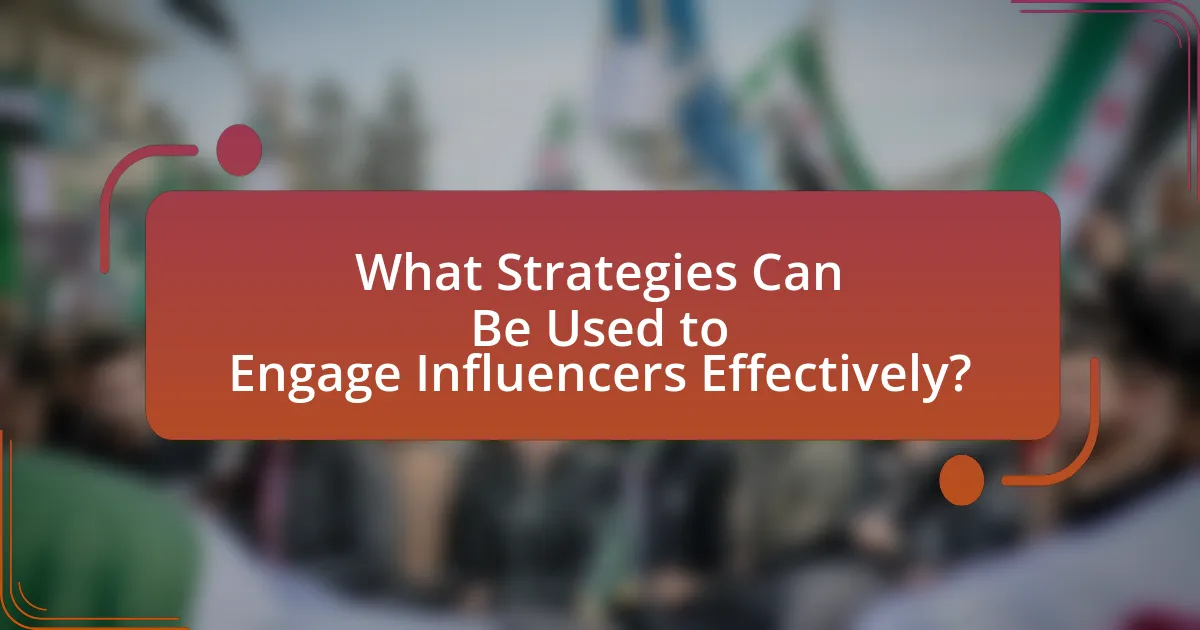
What Strategies Can Be Used to Engage Influencers Effectively?
To engage influencers effectively, political campaigns should utilize personalized outreach, establish mutual value, and leverage data-driven insights. Personalized outreach involves crafting tailored messages that resonate with the influencer’s interests and audience, increasing the likelihood of a positive response. Establishing mutual value means identifying how the collaboration benefits both the campaign and the influencer, such as enhancing their brand or providing exclusive content. Data-driven insights can guide campaigns in selecting the right influencers based on audience demographics and engagement metrics, ensuring alignment with campaign goals. Research indicates that campaigns that personalize their approach see a 30% higher engagement rate with influencers, demonstrating the effectiveness of these strategies.
How can political campaigns identify the right influencers to engage?
Political campaigns can identify the right influencers to engage by analyzing their audience demographics, engagement rates, and alignment with campaign values. Campaigns should utilize social media analytics tools to assess influencers’ reach and the relevance of their content to the target voter base. For instance, a study by the Pew Research Center indicates that 72% of adults use social media, making it a vital platform for influencer engagement. By focusing on influencers whose followers match the campaign’s target demographics, campaigns can ensure that their messages resonate effectively. Additionally, evaluating past collaborations and the influencers’ credibility can further refine the selection process, ensuring that the chosen influencers can authentically connect with potential voters.
What criteria should be considered when selecting influencers?
When selecting influencers, key criteria include audience alignment, engagement rates, authenticity, and relevance to the campaign’s goals. Audience alignment ensures that the influencer’s followers match the target demographic of the political campaign, which is crucial for effective messaging. Engagement rates, measured through likes, shares, and comments, indicate how actively the influencer interacts with their audience, reflecting their influence and reach. Authenticity is vital, as influencers who genuinely resonate with their audience foster trust, making their endorsements more impactful. Lastly, relevance to the campaign’s goals ensures that the influencer’s values and messaging align with the political objectives, enhancing the overall effectiveness of the campaign.
How can campaigns assess an influencer’s audience alignment?
Campaigns can assess an influencer’s audience alignment by analyzing demographic data, engagement metrics, and audience interests. Tools such as social media analytics platforms provide insights into the age, gender, location, and interests of an influencer’s followers, allowing campaigns to determine if these characteristics match their target voter demographics. For instance, a study by Influencer Marketing Hub found that 63% of marketers consider audience demographics crucial for effective influencer partnerships. By cross-referencing this data with their campaign objectives, campaigns can ensure that the influencer’s audience aligns with their messaging and goals.
What methods can be employed to build relationships with influencers?
To build relationships with influencers, one effective method is to engage them through personalized outreach and collaboration opportunities. Personalized outreach involves researching the influencer’s interests and previous work to tailor communication, demonstrating genuine interest and respect for their expertise. Collaboration opportunities can include co-creating content, hosting joint events, or involving influencers in campaign initiatives, which fosters mutual benefit and strengthens the partnership. Research indicates that personalized communication increases response rates by 29%, highlighting the importance of tailored approaches in influencer engagement.
How can campaigns create mutually beneficial partnerships with influencers?
Campaigns can create mutually beneficial partnerships with influencers by aligning their goals and values with those of the influencers, ensuring that both parties gain from the collaboration. This alignment can be achieved through clear communication of campaign objectives, providing influencers with creative freedom to express their authentic voice, and offering fair compensation or incentives that reflect the influencer’s reach and engagement. For instance, a study by the Digital Marketing Institute found that 70% of marketers believe influencer partnerships can enhance brand credibility, indicating that when campaigns effectively collaborate with influencers, they can amplify their message and reach a wider audience while influencers gain valuable content and engagement opportunities.
What communication strategies are effective in influencer engagement?
Effective communication strategies in influencer engagement include personalized outreach, clear messaging, and collaborative content creation. Personalized outreach fosters a genuine connection, as influencers are more likely to respond positively when they feel valued and understood. Clear messaging ensures that the campaign’s goals and values are communicated effectively, allowing influencers to align their content with the campaign’s objectives. Collaborative content creation encourages influencers to contribute their unique voice and style, enhancing authenticity and engagement with their audience. Research indicates that campaigns utilizing these strategies see higher engagement rates and improved influencer relationships, as evidenced by a study from the Journal of Marketing Research, which found that personalized communication increases response rates by up to 50%.
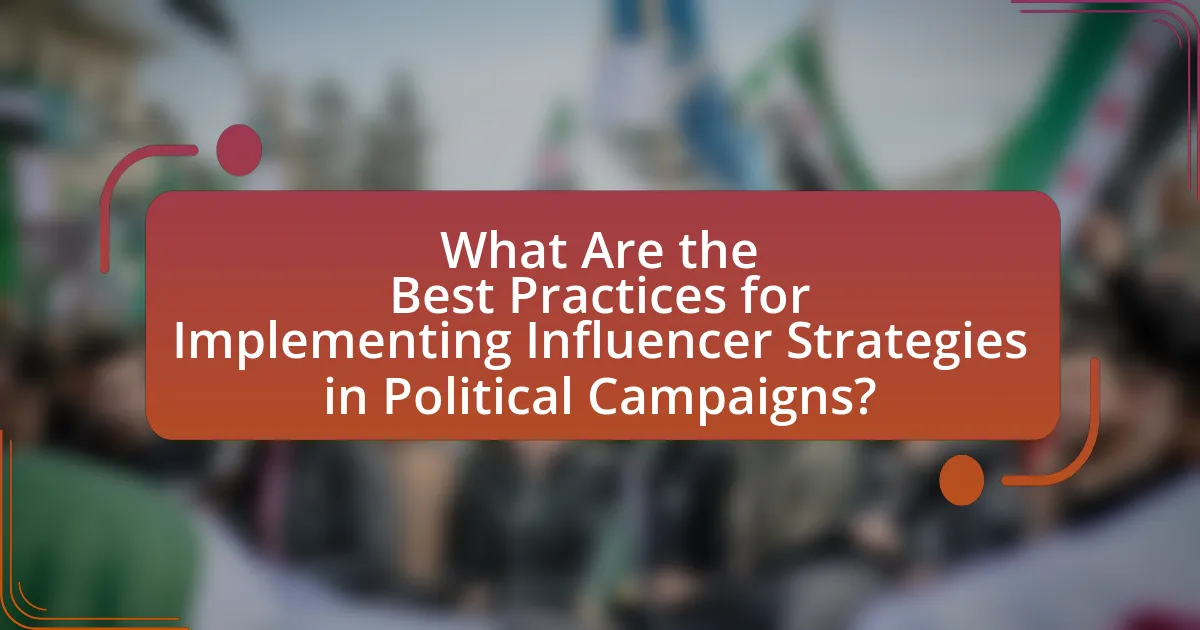
What Are the Best Practices for Implementing Influencer Strategies in Political Campaigns?
The best practices for implementing influencer strategies in political campaigns include identifying relevant influencers, establishing clear objectives, and ensuring authentic engagement. Identifying influencers who align with the campaign’s values and target audience is crucial, as their credibility can significantly impact voter perception. Establishing clear objectives helps in measuring the effectiveness of the influencer’s contributions, whether it’s increasing awareness, driving voter registration, or mobilizing support. Authentic engagement is essential; influencers should genuinely support the campaign to foster trust among their followers. Research indicates that campaigns utilizing authentic influencer partnerships can see a 50% increase in engagement rates compared to traditional methods, demonstrating the effectiveness of these strategies.
How can campaigns measure the effectiveness of influencer engagement?
Campaigns can measure the effectiveness of influencer engagement through metrics such as reach, engagement rates, conversion rates, and sentiment analysis. Reach quantifies the total audience exposed to the influencer’s content, while engagement rates assess interactions like likes, shares, and comments, indicating audience interest. Conversion rates track specific actions taken by the audience, such as signing up for newsletters or making donations, directly linked to the influencer’s promotion. Sentiment analysis evaluates the tone of audience reactions, providing insights into public perception. According to a study by Influencer Marketing Hub, campaigns that effectively track these metrics can see a return on investment of up to $5.78 for every dollar spent on influencer marketing, demonstrating the tangible impact of influencer engagement.
What metrics should be tracked to evaluate influencer impact?
To evaluate influencer impact, key metrics include engagement rate, reach, impressions, conversion rate, and audience demographics. Engagement rate measures the level of interaction (likes, comments, shares) relative to the follower count, indicating how well the influencer connects with their audience. Reach quantifies the total number of unique users who see the content, while impressions track the total number of times the content is displayed, regardless of clicks. Conversion rate assesses the effectiveness of the influencer in driving desired actions, such as sign-ups or purchases. Audience demographics provide insights into the influencer’s follower characteristics, ensuring alignment with campaign targets. These metrics collectively offer a comprehensive view of an influencer’s effectiveness in political campaign media strategies.
How can feedback from influencers improve campaign strategies?
Feedback from influencers can significantly enhance campaign strategies by providing insights into audience preferences and trends. Influencers, due to their established credibility and connection with their followers, can offer valuable perspectives on what resonates with the target demographic. For instance, a study by the Digital Marketing Institute found that campaigns utilizing influencer feedback saw a 30% increase in engagement rates compared to those that did not. This data underscores the importance of integrating influencer insights to refine messaging, optimize content, and ultimately drive better campaign outcomes.
What common challenges do campaigns face when engaging influencers?
Campaigns commonly face challenges such as aligning brand values with influencer authenticity, managing communication and expectations, and measuring the effectiveness of influencer partnerships. Aligning brand values is crucial because influencers with a strong personal brand may not resonate with the campaign’s message, leading to potential backlash or disengagement from their audience. Managing communication involves ensuring that both the campaign and the influencer have a clear understanding of goals, deliverables, and timelines, which can be complicated by differing work styles. Measuring effectiveness is challenging due to the difficulty in attributing specific outcomes, such as voter engagement or sentiment, directly to influencer activities, making it hard to assess return on investment. These challenges are supported by industry reports indicating that 61% of marketers struggle with measuring the ROI of influencer marketing campaigns.
How can campaigns overcome skepticism from influencers?
Campaigns can overcome skepticism from influencers by establishing transparent communication and demonstrating authenticity. Influencers are more likely to engage when they perceive genuine alignment with their values and audience. Providing clear information about campaign goals, strategies, and the impact of influencer involvement fosters trust. For instance, a study by the Pew Research Center found that 70% of influencers prioritize authenticity in partnerships, indicating that campaigns should showcase real stories and data that resonate with influencers’ audiences. By prioritizing transparency and authenticity, campaigns can effectively mitigate skepticism and build stronger relationships with influencers.
What strategies can mitigate potential backlash from influencer partnerships?
To mitigate potential backlash from influencer partnerships, political campaigns should prioritize thorough vetting of influencers to ensure alignment with campaign values and audience expectations. This strategy involves researching the influencer’s past behavior, public statements, and audience demographics to identify any potential red flags that could lead to controversy. For instance, a study by the Pew Research Center indicates that 70% of social media users have unfollowed an influencer due to controversial opinions, highlighting the importance of careful selection. Additionally, campaigns should establish clear communication guidelines with influencers to ensure messaging consistency and transparency, which can help prevent misunderstandings and misinterpretations that may arise during the partnership.
What practical tips can enhance influencer engagement in political campaigns?
To enhance influencer engagement in political campaigns, campaigns should prioritize authentic relationships with influencers. Building genuine connections fosters trust, which is crucial for effective communication. Research indicates that 92% of consumers trust recommendations from individuals over brands, highlighting the importance of influencer credibility. Campaigns can achieve this by involving influencers in the campaign’s narrative development, allowing them to share personal stories that resonate with their audience. Additionally, providing influencers with exclusive content or behind-the-scenes access can increase their investment in the campaign, leading to more enthusiastic promotion. Engaging influencers in interactive formats, such as live Q&A sessions or collaborative events, can also boost engagement by creating a sense of community among followers.
